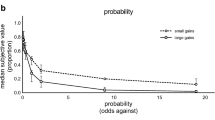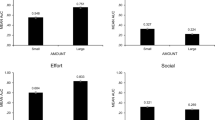Abstract
Delay discounting refers to the reduction in the value of an outcome as a consequence of the delay to its receipt. The rate at which a future event is discounted depends on several factors, but there is little evidence regarding the effects of consequences concurrent with an intertemporal choice. In this study, participants were exposed to a delay discounting task in which an immediate gain (upfront gains) or an immediate loss (upfront losses) was bundled with an intertemporal choice. In two experiments, we explored how the sign (gain or loss) and magnitude (relative and absolute) of the upfront affect discounting rate. Results of Experiment 1 suggest that only the introduction of a significant negative upfront reduced discounting in the small reward condition. In Experiment 2, increasing both the relative and absolute magnitude of the upfront reduced discounting. We discuss these results in terms of factors that modulate the effect of availability and absence of additional resources on discounting.




Similar content being viewed by others
Notes
Weatherly (2012) explains the results of his experiment in terms of a contrast effects, that is, suggesting that rewards become more valuable when the annual income decreases, promoting less discounting.
Equivalency in dollars at the time the experiment took place: approximately US$903 (large reward) and US$112 (small reward). All reward amounts are in Mexican pesos.
References
Appelhans, B. M., Woolf, K., Pagoto, S. L., Schneider, K. L., Whited, M. C., & Liebman, R. (2011). Inhibiting food reward: delay discounting, food reward sensitivity, and palatable food intake in overweight and obese women. Obesity, 19(11), 2175–2182. https://doi.org/10.1038/oby.2011.57.
Bickel, W. K., Wilson, A. G., Chen, C., Koffarnus, M. N., & Franck, C. T. (2016). Stuck in time: Negative income shock constricts the temporal window of valuation spanning the future and the past. PloS One, 11(9), 1–11. https://doi.org/10.1371/journal.pone.0163051.
Critchfield, T. S., & Kollins, S. H. (2001). Temporal discounting: Basic research and the analysis of socially important behavior. Journal of Applied Behavior Analysis, 34(1), 101–122. https://doi.org/10.1901/jaba.2001.34-101.
de Wit, H. (2008). Impulsivity as a determinant and consequence of drug use: A review of underlying processes. Addiction Biology, 14(1), 22–31. https://doi.org/10.1111/j.1369-1600.2008.00129.x.
DeHart, W. B., & Odum, A. L. (2015). The effects of the framing of time on delay discounting. Journal of the Experimental Analysis of Behavior, 103(1), 10–21. https://doi.org/10.1002/jeab.125.
Du, W., Green, L., & Myerson, J. (2002). Cross-cultural comparisons of discounting delayed and probabilistic rewards. The Psychological Record, 52(4), 479–492. https://doi.org/10.1007/BF03395199.
Green, L., Myerson, J., Lichtman, D., Rosen, S., & Fry, A. (1996). Temporal discounting in choice between delayed rewards: The role of age and income. Psychology & Aging, 11, 79–84. https://doi.org/10.1037/0278-7393.31.5.1121.
Green, L., Myerson, J., & Macaux, E. W. (2005). Temporal discounting when the choice is between two delayed rewards. Journal of Experimental Psychology: Learning, Memory, & Cognition, 31(5), 1121–1133. https://doi.org/10.1037/0278-7393.31.5.1121.
Green, L., Myerson, J., & McFadden, E. (1997). Rate of temporal discounting decreases with amount of reward. Memory & Cognition, 25(5), 715–723. https://doi.org/10.3758/BF03211314.
Haushofer, J., Schunk, D., & Fehr, E. (2013). Negative income shocks increase discount rates. University of Zurich Working Paper. Retrieved from: http://www.princeton.edu/~joha/publications/Haushofer_Fehr_IncomeShocks_2019.pdf.
Jiang, C. M., Hu, F. P., & Zhu, L. F. (2014). Introducing upfront losses as well as gains decreases impatience in intertemporal choices with rewards. Judgment & Decision Making, 9(4), 297–302.
Kahneman, D., & Tversky, A. (1979). Prospect theory: An analysis of decision under risk. Econometrica, 47, 263–292.
Mazur, J. E. (1987). An adjusting procedure for studying delayed reinforcement. In M. L. Commons, J. E. Mazur, J. A. Nevin, & H. Rachlin (Eds.), Quantitative analyses of behavior: Vol. 5. The effect of delay and of intervening events on reinforcement value (pp. 55–73). Hillsdale, NJ: Erlbaum.
Myerson, J., Green, L., & Morris, J. (2011). Modeling the effect of reward amount on probability discounting. Journal of the Experimental Analysis of Behavior, 95(2), 175–187. https://doi.org/10.1901/jeab.2011.95-175.
Myerson, J., Green, L., & Warusawitharana, M. (2001). Area under the curve as a measure of discounting. Journal of the Experimental Analysis of Behavior, 76(2), 235–243. https://doi.org/10.1901/jeab.2001.76-235.
Read, D., Frederick, S., Orsel, B., & Rahman, J. (2005). Four score and seven years from now: The date/delay effect in temporal discounting. Management Science, 51(9), 1326–1335. https://doi.org/10.1287/mnsc.1050.0412.
Reyes-Huerta, H. E., & dos Santos, C. V. (2016). The absence of numbers to express the amount may affect delay discounting with humans. Journal of the Experimental Analysis of Behavior, 106(2), 117–133. https://doi.org/10.1002/jeab.218.
Story, G., Vlaev, I., Seymour, B., Darzi, A., & Dolan, R. (2014). Does temporal discounting explain unhealthy behavior? A systematic review and reinforcement learning perspective. Frontiers in Behavioral Neuroscience, 8(76), 1–20. https://doi.org/10.3389/fnbeh.2014.00076.
Sun, H. Y., & Jiang, C. M. (2015). Introducing money at any time can reduce discounting in intertemporal choices with rewards: An extension of the upfront money effect. Judgment & Decision Making, 10(6), 564–570. https://doi.org/10.3389/fpsyg.2016.01256.
Weatherly, J. N. (2012). Altering participants’ hypothetical annual income can alter their rates of discounting the same delayed monetary outcome. Journal of General Psychology, 139(1), 42–54. https://doi.org/10.1080/00221309.2011.652236.
Author information
Authors and Affiliations
Corresponding author
Ethics declarations
Conflict of Interest
The authors declare that they have no conflict of interest.
Ethical Approval
All the procedures were performed in accordance with ethical standards of the institutional human research committee of the Autonomous University of Aguascalientes and with the 1964 Helsinki declaration and its later amendments.
Availability of Data and Materials
Data supporting the findings of the present research will be available upon request from the corresponding author.
Additional information
This research was supported by Grant 281949 from the National Council for Science and Technology (CONACyT). We thank Daniel Torres for conducting pilot studies, as well as Frida Rangel for help with data collection of the present study.
Publisher’s Note
Springer Nature remains neutral with regard to jurisdictional claims in published maps and institutional affiliations.
Rights and permissions
About this article
Cite this article
Reyes-Huerta, H.E., Valerio, C. & Carranza, R. Is the Value of Future Rewards Independent of Gains and Losses Concurrent with Intertemporal Choices?. Psychol Rec 71, 149–156 (2021). https://doi.org/10.1007/s40732-020-00424-z
Published:
Issue Date:
DOI: https://doi.org/10.1007/s40732-020-00424-z




